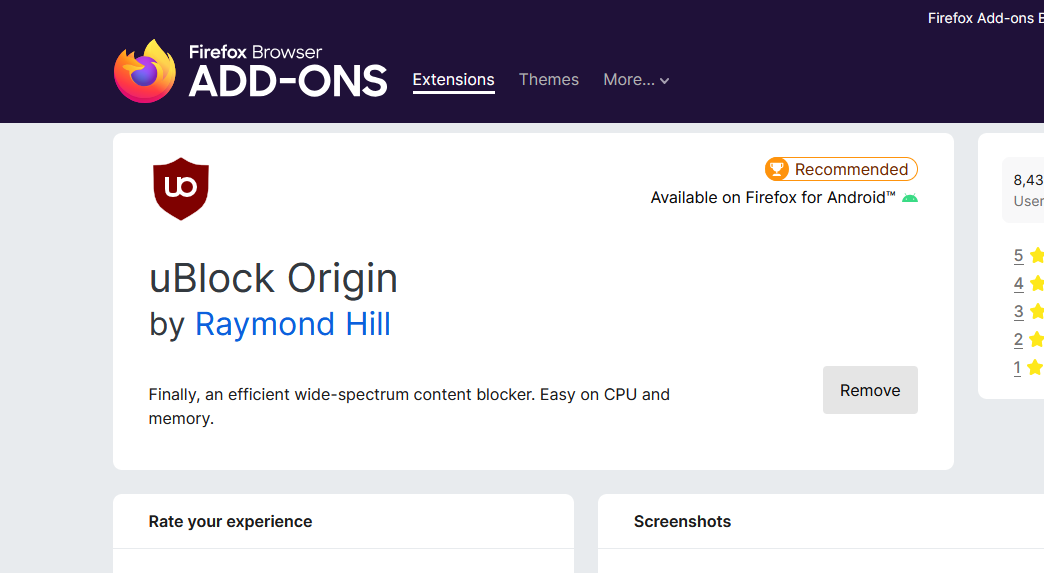Mozilla recently removed every version of uBlock Origin Lite from their add-on store except for the oldest version.
Mozilla says a manual review flagged these issues:
Consent, specifically Nonexistent: For add-ons that collect or transmit user data, the user must be informed…
Your add-on contains minified, concatenated or otherwise machine-generated code. You need to provide the original sources…
uBlock Origin’s developer gorhill refutes this with linked evidence.
Contrary to what these emails suggest, the source code files highlighted in the email:
- Have nothing to do with data collection, there is no such thing anywhere in uBOL
- There is no minified code in uBOL, and certainly none in the supposed faulty files
Even for people who did not prefer this add-on, the removal could have a chilling effect on uBlock Origin itself.
Incidentally, all the files reported as having issues are exactly the same files being used in uBO for years, and have been used in uBOL as well for over a year with no modification. Given this, it’s worrisome what could happen to uBO in the future.
And gorhill notes uBO Lite had a purpose on Firefox, especially on mobile devices:
[T]here were people who preferred the Lite approach of uBOL, which was designed from the ground up to be an efficient suspendable extension, thus a good match for Firefox for Android.
New releases of uBO Lite do not have a Firefox extension; the last version of this coincides with gorhill’s message. The Firefox addon page for uBO Lite is also gone.
Sometimes you really have to stop and ask yourself what the fuck is going on at Mozilla’s HQ. It’s insane how they manage to shoot themselves in the foot at least once a week.
Google’s vassal company
Yep. What is the likelihood of coincidence when 1) Google’s just released manifest V3 2) is cracking down hard on ad blocking 3) is failing hard at being more than a nuisance to ad block users and 4) Mozilla is attacking its most widely used 3rd party feature; the core feature of Google’s scorn.
This is why I don’t donate money to Firefox. Mozilla, the for-profit corporation, should not exist. It’s a parasitic entity that has no value, need, or right to exist. Users should be able to donate to Firefox and vote on specific features, without Mozilla swinging its dick around and ass blasting us all. If donations were transparent and accountable, I’d donate hundreds of dollars a year, for the rest of my life. Because of Mozillas continuous ratfuckery, they get nothing from me. I wonder how true that is for the majority of its user base.
I think this is what’s happening.
If Google loses appeals, Mozilla (and many other browsers that rely heavily on getting their revenue from Google), will have to find new ways to generate revenue. Unfortunately, they seem to be looking for the easiest way out, and that’s selling out their users.
It’s intentional
I fear these kind of mistakes will happen much more frequently in the future; thanks to AI tools.
I’m convinced that 80% of all these threads and the responses within them are astroturfing by Google to cause everyone to despair that Mozilla is no better than Google and that there will never be anything that could be developed to compete with Google if Mozilla went under.
There’s just too goddamn many of them and they’re all filled with the same negative comments. It’s just like the “no way bro, I love paying for YouTube why you gotta have everything for free bro?” bullshit from a few months ago.
I’ve noticed the same thing you have, but I suspect it has a different explanation. I think it’s more an echo chamber thing. People have said variations of this for a while now in HN comment threads, on reddit and here. And there’s a snowball effect from more people saying it.
But there’s been a throughline of bizarrely apathetic and insubstantial low effort comments. That’s the one thing that has tied them together, which is why I think they are echo-chambery. Just for one example: one guy just never read a 990 before (a standard nonprofit form), and read Mozilla’s and thought it was a conspiracy, and wrote an anti-Mozilla blog post. And then someone linked to that on Lemmy and said it was shady finances. Tons of upvotes.
But I’m convinced that no one reads through these links, including the people posting them. Because it takes two seconds to realize they are nonsense. But it doesn’t stop them from getting upvoted.
So my theory is echo chamber.
I think it’s probably a combination of both. There’s an astroturfing campaign going on somewhere, just not on Lemmy, which is overall too small and insignificant to target. But astroturfing works - it creates the echo chambers you’re talking about, it creates apathy. Most people just read headlines, not even the comments. You read a bad story about Mozilla once a week and you’ll start to internalize it - eventually your opinion of Mozilla will drop, justified or not, to the point where you’re willing to believe even the more heinous theories about it.
So you end up with a lot of people who’ve been fed a lot of misleading half-truths and even some outright lies, who are now getting angry enough about the situation they think is going on to start actively posting anti-Mozilla posts and comments on their own.
Right - I think either way there’s a snowballing effect. Astroturfing, at least as far as I can tell, can be notable for at least trying to make coherent arguments. Echo chambers I would say are characterized by fuzzy thinking, and I’ve seen more of the latter here (especially in this thread).
That said, sometimes the goal of astroturfing isn’t to make a point but to degrade conversations with noise and nonsense, extrapolations and digressions. In light of that, I suppose that too could explain some of what we’re seeing.
I also noticed the same trend here and elsewhere as well.
Dude SAME. I find it extremely hard to believe that Google would astroturf Lemmy but it really does feel like all of a sudden in the past ~month a bunch of vague or minor complaints being repeated over and over in every thread.
I use to follow a subreddit called /r/degoogle, which was nominally for conversation about how to remove and avoid using google products. … But I ended up leaving because in pretty much every thread there was a whole lot of posts shitting on any and every suggested alternative, mostly for not being hardcore enough. It was as if the only acceptable approach was to never use any electronic device ever again. Firefox of course was constantly under fire for taking money from Google; which apparently made them worse than Google themselves. … Anyway, I strongly suspected that people were deliberately trying to destabilize the group so that it couldn’t grow or become functional. I had no other explanation for how counter-productive the bulk of the conversations were, and it would certainly be an easy and potentially useful group for pro-google people to target.
I’m less convinced that it is happening here though, but I’m certainly more suspicious of it after that experience with /r/degoogle. I reckon probably why we see a lot of any Mozilla stuff here is just that the audience on Lemmy is very interested in what Mozilla is doing - and negative news always gets more traction than positive news.
as a non google astro turfing shill (you’ll have to take my word on this one lmao.)
I kinda get it, 80% of mozillas revenue comes from google? If that monopoly case doesn’t kill mozilla, this might.
I could see google trying to pull some shit like this.
Mozilla doesn’t need 80% of its revenue to do a good job of maintaining a browser codebase. So it’s a good thing that that funding could disappear, Mozilla could fold like a lawn chair and the next open-source fork that everyone got behind would pick right up and probably do a better job at the core task than Mozilla is.
This idea that open-source software requires more than a dedicated contributing community is (one of many) memes created by the likes of Google and Microsoft in order to snuff out FOSS competition.
i could see that being the case, i would expect it to be the case, but judging by how much the CEO of mozilla gets paid, idk how long that will last…
Although the open source nature of it would be highly beneficial, it might give grounds for google to be a literal monopoly, so maybe that would be productive even. Who knows.
- who would astro turf on Lemmy?
- Google needs Mozilla like Microsoft needed Apple in the 90s
- Astroturfing is trivial, they have a dedicated groups of people doing it and they do it everywhere it’s their job
- Maybe so, but that doesn’t mean they wouldn’t prefer it if Mozilla got behind Manifest V3
They’re getting slammed in court cases. I’d say they have motivation.
no way bro, I love paying for YouTube why you gotta have everything for free bro?
Yeah bro, by are you not paying for freeing everything YouTube? Do you get the picture?
Yep. It’s infuriating. These Firefox communities are trash.
We should verify users somehow. No idea how, but I don’t see a future for the internet without it.
How do we prevent that from being abused to ostracize users who people just disagree with? Like how downvotes are used to suppress distenting opinions.
Good faith mods? AI trained on detecting bias terms and concepts? Community notes? No idea, maybe we should try all the above. The internet frequently rewards bad actors, so targeting those rewards should help.
(Uhhh, AI in charge of censorship? So no one knows how decisions are made? No one can know with AI. That’s just a large mistake. The other ideas have some merit though.)
So much for capitalizing on Chrome’s missteps when it comes to ad blocking I guess
deleted by creator
The article you linked makes a big deal about literally nothing. We’ve known Chrome was going to drop MV2 for years. We also know Firefox won’t. There is nothing more they have to do or say about this situation. It doesn’t affect Firefox whatsoever.
“Suspiciously silent” is such a bullshit nothing accusation to make. It is so obviously trying to capitalize on how many users have been (justifiably) turning on Mozilla as of late.
deleted by creator
It’s not “handy.” It’s badly-written arrant clickbaity tendentious anti-Firefox garbage. Mozilla does plenty of stupid things. I do not understand this desire some people have to invent more. It appears that many of them have simply decided based on Mozilla’s now-discontinued efforts to improve social media that Mozilla is too “woke” and therefore the enemy, or something like that.
It’s a bit ironic because Steve Teixeira, who sprearheaded Mozilla Social, got fired after bringing to light the fact that Mozilla wasn’t an inclusive company. I’m a fan of inclusivity, and I agree that accusations of “woke” are meaningless, but I didn’t spot any in that article.
As the other commenter noted, this is kind of a nonsensical article. I am not by any means a fan of Mozilla’s decision on Ublock, it seems egregious and indefensible. But the convoluted logic of making Manifest V3 about Mozilla is completely emptyhanded, and there’s no rhyme, reason, logic, or precedent suggesting we should make anything of their absence of a statement.
Also, this is especially nuts because Mozilla HAS in fact criticized Manifest V3! They just happened not to have done so within a particular randomly selected window of time.
deleted by creator
Your own 2023 article doesn’t say anything about policies allowing Mozilla to sell private data, and Mozilla’s own website openly and proudly claims they neither buy nor sell their users’ data.
And Anonym is a company purpose-created to try to transform the advertising industry into a more privacy-respecting industry. Its mission could not align more with Mozilla’s. They in particular developed PPA, the feature Firefox was getting so much bad press about last week - and which ended up being none of the things the dozens of articles posted about it claimed. It is, in fact, a complete non-factor when it comes to privacy risks, and its explicit purpose is to pivot the internet toward a significantly more private ecosystem.
There are lots of people claiming Mozilla is becoming an advertising company and is selling their users out. There’s some misleading evidence that even makes that superficially appear true. But it’s false.
The fact that Mozilla hasn’t talked much about ad blockers since then is, I think, significant.
When have they talked about ad blockers in the past, period? This is just a meaningless scare tactic. I don’t see them talking about arctic drilling either - should I be concerned?
From the same page you got your image from:


deleted by creator
From the same privacy policy you linked:


I don’t personally understand the disconnect between the parts we each posted, but there is a clear disconnect regardless.
And, regardless, this applies to fakespot.com. Not Firefox. Not even slightly Firefox. Firefox unambiguously has nothing to do with selling user data.
Edit: I’ve also gone ahead and sent an email to the address at the bottom of the policy asking for clarification on the issue.
Four weeks later edit: They replied to my email. Here is their response:
Hello, Thank you for contacting Mozilla and for your question. At this time, Fakespot does not sell or share any user data pursuant to any applicable privacy laws. The only data we share outside of Mozilla are generalized aggregated metrics with service providers who make Faksepot run to help us with logging and debugging issues to provide an uninterrupted experience for our customers, and we do not share this data for monetary gain. We are in the process of updating our privacy policy for additional clarity on all the points referenced in your email. We trust this answers your questions and thank you again for reaching out. Kind regards, Mozilladeleted
I just have to stop and note something here. This is an incredibly disorganized way to carry on a conversation. I feel like you didn’t pick up most of what I put down, and instead, you’ve opened two new pandoras boxes, stacking a mess on top of another mess.
So just to recap:
- You posted an opinion article criticizing Mozilla from a place called FOSSpost
- I noted that it was a bizarre article because it was about something not directly tied to Mozilla, and the logic trying to tie Mozilla to it was questionable
- I noted even if you entertain this bizarre logic (which you shouldn’t!) Mozilla has criticized V3 in the past
- I noted that given that they have criticized it in the past, the only way this already bizarre logic would make sense was if remaining issue is the timing, but even so that’s entertaining the bizarre assumptions of the article
Phew. So now you’re talking about timing.
I wanted to do my best to take the feeling of disorientation at the strangeness of your comment and turn it into words, so here goes: (1) I feel like the essence of the point isn’t about the timeline of Mozilla acquisitons (not mentioned by your first article) but about the article’s questionable logic of interpreting silences to mean something, which hinges on all kinds of subjective choices about how you interpret context (2) the point you seem to be making now, is about a shift in Mozilla’s motivations and identity, which is a very nebulous and subjective thing, and hardly even the kind of thing you can establish with an article or two (3) you don’t seem to be up to the task of attempting a nuanced reconciliation between the table you posted and the other privacy policy info on the same page that the other user brought up (4) the article you posted together with the table doesn’t contain the table or anything affirming your description (I found the table via google but it’s a disorienting way to organize the information) (5) even if your interpretation was reliable it wouldn’t mean silence during a particular news cycle was proof of anything (6) none of these things establish a motivation for sympathetic behaviors toward Google (in fact it would seem to be the opposite) (7) there’s not any reason to think these are the best pieces of context to be brought to bear on this question, (what about, for instance, the fact that Mozilla has their own modded version of V3 that restores add blocking? That seems at least as relevant to gauging their true intentions as anything you have posted, given that the first article was about V3).
Even if you were 100% right, there has to be a way to make this argument that doesn’t require everyone reading it to reach for the dramamine. It’s a disorganized mess.
I’m sorry you don’t follow the logic, but to simplify it for you, I’ll break it down: ever since Mozilla picked up an ad subsidiary, they became an ad company. Kind of like how Google is an ad company even though they only have an ad subsidiary too.
And because Mozilla is an ad company, we need to watch how they describe advertisements to us, because they have a huge conflict of interest. It would be bizarre, as you say, to act otherwise.
Do you still follow, or would it be more helpful if I made a post about it on this community to remind people how Mozilla has become an ad company over the past year?
Regardless, that is all I was trying to do: to get people to think a little bit. Stay curious!
I’m sorry, but you’re not at all taking responsibility for your mess, and trying to re-frame this as you being simply too smart for this world is kind of a deadbeat move.
If you think nobody else knew that Mozilla and Google get revenue from ads, like it’s something you need to “help” everyone understand, you’re underestimating the knowledge of people you are communicating with and overestimating yours.
How does any of this connect to the FOSSpost article you shared from like 2 comments ago? The argument from FOSSpost was originally “Mozilla has been silent”, but then it changed to “Oh, well actually Mozilla did criticize it, but since then they’ve changed, so they need to criticize them again”.
Speculating on the meaning of a “silence” and treating it like proof of something is already a terrible way to reason for reasons that seem so obvious to me I would never expect to have to explain it in a serious conversation. There are better ways to gauge their commitments than that, there are better pieces of evidence to set the context, the evidence you are putting forward is mixed rather than decisive… and these are all the things I already said the last time around.
Yet here you are, offering to “help” me follow as if this lowly train wreck was a brilliant point that’s being misunderstood out of a deficit of curiosity.
Okay, we are making some progress. You and I both agree that Mozilla has changed into an advertisement company. Can we both also agree that this means they have a conflict of interest with advertisements now?
Do you also understand that it’s important to reassess someone’s opinion on something after the conflict of interest arises? For example, if a politician got a huge cash donation from a lobbying interest, would you actually be saying “well, the politician criticized the lobby once” and absolutely freak out if anybody said things needed to be reevaluated?
deleted by creator
deleted by creator
Oh, you’re one of those people who can’t accept responsibility for anything. Got it.
“Oh, I’m sorry that YOU had a problem, but…”
deleted by creator
Y’all realize a random employee performing the add-on store review process isn’t representing Mozilla’s or the Firefox teams entire position yeah? This kind of stuff happens all the time with all stores that have review processes.
Firefox Addons store prob needs to improve its process, gorhill is justified in being mad, and I understand if he needs a punching bag between this and google, but, as someone who also develops extensions… These things happen. It’s just a part of building browser extensions.
that employee needs fired
If this is due to a single employee making a mistake then I would be inclined to question Mozilla’s policies for removal of popular extensions more than fire the employee.
No, that’s not how that works. What needs to happen is a change in process so that a single employee can’t pull a extension by mistake
This could only lead to a hostile work environment. The process and checks in it is what needs to be questioned. If it came out it was an executive bypassing process, then yes. Otherwise the process can be updated and improved. It also needs to be publicly disclosed why it happened given the nature of the claims.
A review and a conversation may be in order, but firing might be harsh considering the circumstances
Mozilla says the addon has problems, the developer says it doesn’t. Are there any 3rd parties that can weigh in on this?
Mozilla doesn’t show their work (the reasoning behind the removal) but gorhill does.
Being on the fence is an interesting position to take, but I would be genuinely shocked if one of the most reputable creators of one of the most reputable extensions of all time is lying to its user base about the locations and contents of the files in the open source extension that can be audited by literally anybody just by browsing to that directory on their computer, because in addition to being open source on GitHub, it’s the same source on your PC.
ETA:
Mozilla also accuses uBlock Origin Lite of not having a privacy policy (a detail I removed from my post for brevity’s sake) but gorhill provides a screenshot of it. I guess that could have been faked too. Less difficult to fake: the archives of the privacy policy on Mozilla’s site, which took me too long to track down
I’m not sure why you think “being on the fence is an interesting position to take”, I’m glad there are people out there who have the skills to look at the code and see if it’s doing what people claim it is doing or not, I am not one of them. I just want a browser that doesn’t treat me like a piggy bank and less ads. I don’t know the developers reputation and simply asked for more knowledgeable people to chime in, sorry if that’s a problem for you.
For what it’s worth, Firefox is absolutely still the browser that doesn’t treat you like a piggy bank and has options to eliminate ads.
I think because, in this context, it’s because there was an extensive explanation of the problems with Mozilla’s decision on this page.
My own reading of the situation on the developer’s GitHub is unfortunately that the review by Mozilla is indeed completely inaccurate in every way. No way to even read it as a “Each side has their own story” type of thing since they reproduce Mozilla’s emails verbatim. They seem just materially incorrect. The source files referenced by the emails are visible on the same GitHub account, along with their complete histories showing no changes at all - the issues referenced don’t and never did exist.
The only redeeming thing I can find is that the dev (ambiguously) seems to have never replied to the email from Mozilla about the issues, and so Mozilla was never made aware that there was an issue with the review that needed fixing. They seem to have done this because they perceived the process as hostile and not worth engaging with, which… fair, I guess.
I understand where the dev is coming from but I think he still should have just replied to Mozilla. This is clearly a mistake on their part. The dev just seems pissed off and decided to not reply out of emotion. His call I guess but I don’t agree with that approach.
I agree that they should have replied, and that replying probably would have even fixed the mistake, but I also can’t find it in me to fault them in this situation. Getting those emails would have been both frustrating and insulting, and one of their messages on the linked GitHub page goes into the various stresses the situation puts them through.
I don’t agree that there’s enough evidence here to decide Mozilla’s actions were hostile/malicious - maybe if they were given a chance to fix things and still didn’t, but everyone makes mistakes. Incompetent, sure, malicious, not enough evidence.
Yea I don’t think Mozilla did it maliciously. I think either some dumbass analyst fucked up, or they ran it through AI, and the AI is dogshit and fucked up. Those are my guesses.
Who knows? The file that got incorrectly marked as collecting or transmitting data was named “googlesyndication_adsbygoogle.js”. I’m sure that’s a very reasonable guess for what a file with that name would do… in most add-ons. But like, obviously not in this one. My best guess is the reviewers have some type of tool that’s intended to help them find issues, it flagged the referenced files, and the reviewer either couldn’t or didn’t properly verify the files were actually issues.
Yea I think it’s an honest mistake. I don’t see this as “hostile” to Gorhill. I have no idea why he thinks this. It’s really weird.
AI seems like a possibility. I find it slightly easier to believe that someone in management was stupid enough to replace human reviewers with bots than that someone in a position to decide what gets accepted had never heard of UBO and didn’t realize that it’s an important one.
Either way they really ought to explain themselves.
Well Gorhill would need to respond…which he said he won’t do so rip.
Whether or not Mozilla chooses to issue some kind of meaningful statement about what happened beyond the boilerplate “oops, it was an error” is not up to Gorhill.
That’s Gorhill for you, very pissed off, very emotional, not very emotionally bright.
That’s like every developer of these tools lol.
Gorhill does not seem like the sort of person to respond to problems by giving Up.
This is the developer who responded to the creation of Manifest V3 by pioneering a hack-free V3-compliant addon, and ended up making it genuinely compelling.
This issue has been solved, it’s done and it’s gone, there’s no needs to bring it back, the uBlockLite developer is happier to not have to maintain UBOL for Firefox honestly, it’s a waste of time, there’s no reaons to use UBOL when UBO exists.
Except, you know, the reasons stated above. He didn’t just make a lite version for no reason
My guess is that it was flagged by AI
That explanation does seem plausible, but Mozilla’s emails say the review was performed manually. Either way, the result wasn’t great.
Tired of this AI bullshit creeping into and ruining everything. Unfortunately this is probably just the beginning.
Edit: bloody hell, I hadn’t looked into Brave that deeply yet, fuck Brendan Eich and fuck Peter Thiel.
Jesus. A day without bad news from Mozilla would be nice. I am beginning to feel a distinct need to switch browsers.
and Brave is currently looking like the best balance between compatibility and privacy. I’ve only been resistant to Brave because it’s based on Chromium andI want to support non-Chrome browser engines, but the Firefox forks I’ve tried like Waterfox and Pale Moon just aren’t there yet in terms of usability for me (primarily, wide protocol support for web video playback).Anyone got any better suggestions, by any chance?
Brave is currently looking like the best balance between compatibility and privacy.
Brave is the funding vehicle of a far right political activist. Fuck Brendan Eich, fuck Brave.
IIRC it’s not just Eich but also political agent Peter Thiel, the guy who created a surveillance network so powerful that the NSA relies on him.
IIRC it’s not just Eich but also political agent Peter Thiel
Seems you’re right: https://www.cnet.com/tech/services-and-software/new-funds-help-browser-maker-brave-try-ridding-the-web-of-nasty-ads/
I had forgotten why I dropped Brave. This was why.
Brave is also Chromium-based, so switching to that does nothing to promote a web without a Google engine monopoly. Of the three serious engine developers, Google (Chromium), Apple (WebKit), and Mozilla (Gecko), Mozilla is still the least worst option (and that’s saying a lot as this story makes evident once again). FF alternatives like LibreWolf rely in Mozilla Firefox development because they don’t do engine development. I hope the Servo revival turns that into a serious contender.
That’s why I still use FF. I wish they were run by better people, but it’s still not on par with Google’s shit.
And they still offer useful features/services like email masks, cookie containers, and a VPN (which is rebranded Mullvad). If they were awful bad actors, they would be running their own exit nodes and surreptitiously collecting user data that way.
deleted by creator
Let’s also not forget their many privacy violations, including secretly whitelisting Facebook trackers that everyone seems to have forgot about.
It’s very privacy focused but if sites break you can turn of fingerprinting protection and thing like that in the settings with one click.
Great browser
LibreWolf still depends on Firefox for continued development. If Mozilla goes under, I don’t see it having all that much of a future.
If Mozilla goes under, the main funders (except google) will start funding the librewolf team instead, and they’ll have more than enough resources to maintain the browser since librewolf devs don’t spend 99% of their funding on other garbage unlike Mozilla. Maybe it is about time we hand over the browser to more capable people.
Librewolf is a tiny niche within a tiny niche. No one at Google has even heard of it, and they’re certainly not going to start throwing money at a tiny obscure browser fork with zero web engine development experience if Firefox dies. Librewolf is a cool project, and I will gladly recommend it, but it dies with Firefox. It only even makes sense to consider the possibility if you have absolutely no self awareness of how small of a community we are at all.
I don’t know, we’ve had small communities grow gigantic overnight after a larger one collapsed. Lemmy being one example. I think once something like that happens, more developers and users will flood librewolf.
Wanting privacy is no longer niche. People just don’t know where to go.
Lemmy is very much not gigantic. It has tens of thousands of acitve users. Reddit has hundreds of millions. Librewolf is even more niche than Lemmy is. Librewolf isn’t even really a browser, it’s just a small patchset for Firefox. It only has it’s own name and logo because Mozilla doesn’t like people distributing modified versions of Firefox with their branding attached. Librewolf is very cool, but jumping straight from that to full on taking Gecko maintenance on completely is just a silly idea. I hope that if Mozilla does fail someone takes over Firefox from them, but Mozilla isn’t running out of Google money any time soon, and Librewolf isn’t even likely to be who takes it over if it does happen. It’s way more likely to end up in the hands of a big Linux distro, or even a new organization formed specifically for the purpose of taking Firefox over. All this talk of Librewolf being the savior of Gecko based browsers is completely disconnected from the reality of what Librewolf is.
I hope that if Mozilla does fail someone takes over Firefox from them
I’m of course rooting for Mozilla, but if things do go sideways…
Please be Proton, please be Proton
Check out zen browser! Built on Firefox and takes inspiration from arc. Built by a solo dev. I’ve really been liking it. https://zen-browser.app/
Edge with adblock seems fine. No matter what free browser you pick they find ways to profit.
Mozilla has been doing too many shady things recently.
when ublock goes, i go :p
Where, Chome land?
librewolf or that other browser that’s in development, i forget the name
Floorp? Zen?
Ladybird I think
Arc?
Ladybird?
It won’t even reach Alpha until the summer of 2026 at a minimum. I wouldn’t expect it to be a replacement for another few years assuming it doesn’t fade away.
uBO is still available:

i’m starting to think, that mozilla execs are just google in disguise.
And I just installed uBOL on a couple of company employee laptops expecting it to be future-proof. Should’ve stuck with uBO.
Sooner or later it’s time to move to the smallweb
Reviving a long-dead thread for a relevant update, in a top-level post because you deleted all of your replies in the thread where it was relevant.
Mozilla did reply to my email asking for clarification on their Fakespot privacy policy, and whether they collect or sell user data, as we were discussing - though that reply took them four weeks. Their response in full:
“”" Hello,
Thank you for contacting Mozilla and for your question. At this time, Fakespot does not sell or share any user data pursuant to any applicable privacy laws. The only data we share outside of Mozilla are generalized aggregated metrics with service providers who make Faksepot run to help us with logging and debugging issues to provide an uninterrupted experience for our customers, and we do not share this data for monetary gain. We are in the process of updating our privacy policy for additional clarity on all the points referenced in your email.
We trust this answers your questions and thank you again for reaching out.
Kind regards, Mozilla “”"
What an email to read. I find it particularly valuable for the things it does not say, but not at all encouraging.
We are in the process of updating our privacy policy for additional clarity on all the points referenced in your email.
They don’t say the TOS is incorrect or too broad. And they don’t say they will remove their promise to sell private data to advertisers.
At this time, Fakespot does not sell or share any user data pursuant to any applicable privacy laws.
At this time? Pursuant to the law? If Mozilla is abiding by law and nothing more, that explains why they are legally forced to admit they sell private data to advertisers.
And the law is the lowest bar imaginable. Google operates under the law. Is Mozilla not better than them?
… service providers who make Faksepot run…
…and they can’t spell their own name right.
God, you’re exhausting. They don’t sell the data. Get over it. The email left no room for ambiguity. You’re reaching so far it’s embarrassing. Are you really that jaded?
You posted a privately sent email that contradicts a publicly accessible privacy policy. In the four weeks it took them to send that to you, nothing has been changed, same as the prior year. And they couldn’t even bother to spell their own product name right.
Do you acknowledge that the privacy policy makes it extremely clear that they do sell private data, as outlined in the table that they made for people who struggle to read and mentally parse full paragraphs of text?
Hey, it’s been a few weeks. Guess whether Mozilla has updated their privacy policy yet!
It’s very clear what they say on their corporate website, right?



















